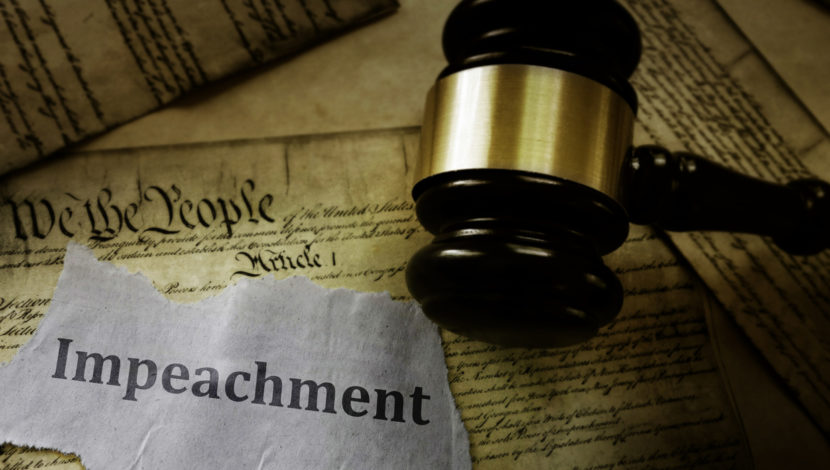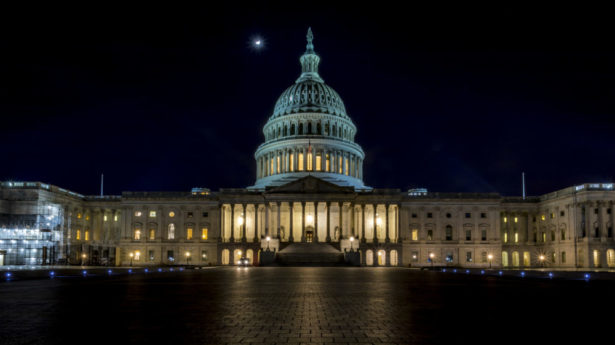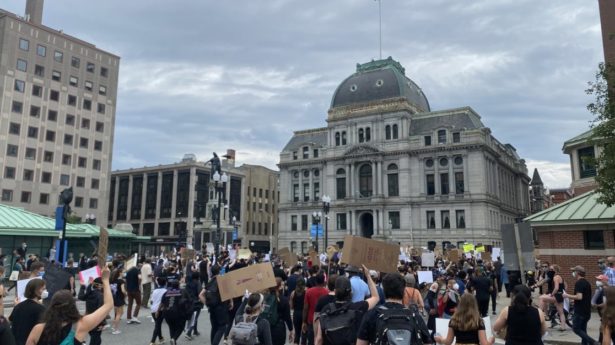The Unitarian Universalist Service Committee advances human rights through grassroots collaborations.
Join UUSC in Calling for Impeachment: Learn More & Take Action

By on January 12, 2021
On January 6, 2021, a white supremacist mob—incited by the U.S. president—stormed the U.S. Capitol in an attempt to overturn a democratic election. Not only did the perpetrators of this attack destroy public property and assault one of the most hallowed symbols of U.S. democracy, some also made plain their intent to assassinate or kidnap members of Congress and murder the Vice President. Many were adherents of the debunked QAnon conspiracy theory, the Proud Boys, and other extremist movements, and some arrived at the Capitol sporting racist, antisemitic, and Neo-Nazi insignia.
President Trump’s guilt in instigating this violence is plain. Not only did he fail to contain the attack unleashed on the Capitol, he invited it—perpetuating false claims of a stolen election and calling on his supporters to be “wild” and to “fight hard.” As horrifying as these actions are, they are also far from the first time President Trump has encouraged violence or enabled the activities of white supremacist groups. For these reasons, UUSC is calling for Trump’s immediate impeachment and removal from office. Below, we address some frequently-asked questions about our stance.
What makes the events of January 6, 2021 in Washington D.C. different from the racial justice protests across the world in 2020?
The January 6 assault on the Capitol is part of a long history of white supremacist violence being used to trample on democracy and disenfranchise people of color—in this case, by attempting to effectively throw out the votes of millions of U.S. citizens. By contrast, the racial justice protests following the police murders of George Floyd, Breonna Taylor, and others, sought to expand civil rights and hold public officials accountable for taking the lives of Black people. Unlike the attack on the Capitol, meanwhile, the vast majority of these protests were peaceful, in spite of right-wing rhetoric to the contrary.
It is true that, in all protests, individuals may commit acts of violence or mayhem, and leaders of protest movements should not be held responsible for actions they did not invite or condone. It is particularly necessary to insist on this point, because many state legislatures are currently trying to crack down on peaceful dissent by holding organizers collectively liable for the actions of individual participants in a protest. (Some states have already started capitalizing on the Capitol violence to do so; UUSC is organizing to oppose these threats to First Amendment rights through our Right to Resist campaign.)
Directly encouraging violence is a different matter, however; and the President of the United States also has special responsibilities to fulfill his oath of office that distinguish him from ordinary protesters. Whether or not President Trump’s remarks on January 6 constitute a criminal incitement of violence, they certainly betray his obligation to defend the U.S. Constitution, as we discuss further below.
Did law enforcement respond differently to the events of January 6 versus how they have responded to racial justice protests?
Yes. As numerous observers—including the President-elect—have pointed out, the law enforcement response to the Capitol riot was noticeably muted, compared to the harsh and violent crackdowns police have unleashed on peaceful protesters of color. During the Black Lives Matter protests of summer 2020, numerous incidents were recorded around the country of police responding to nonviolent protesters with unchecked brutality. Indigenous water protectors at Standing Rock were soaked with fire-hoses in subzero weather and subjected to mass arrests, simply for opposing construction of a pipeline on their lands.
In June 2020, the need to protect public property was invoked as a pretext to mobilize a massive federal crackdown on racial justice protests in Portland, Oregon. In the course of this response, federal agents attacked nonviolent protesters and kidnapped citizens off the streets in unmarked vans. The contrast between how the administration treated Black Lives Matter protests in Portland, and the image of law enforcement standing by while a white mob trashed the halls of Congress, has impressed itself on the minds of millions. This discrepancy is unmistakably due to the racist bias that still infects nearly every institution of U.S. public life.
Should we respond to the insurrection on January 6 by passing new anti-terrorism measures?
While the unjust disparity discussed above may suggest the need for a more robust law enforcement response to white supremacist violence, it is important to recognize that many of the actions the mob perpetrated on January 6 are already illegal—invading the Capitol, stealing and damaging public property, etc. The individuals responsible must be held accountable for these actions under existing laws.
At the same time, we should resist calls to enact new laws heightening penalties or creating new criminal offenses for “domestic terrorism.” Not only would such laws be unnecessary and duplicative, they also risk interfering with civil liberties and would most likely be weaponized against activists of color.
For these and similar reasons, UUSC’s friends at the Muslim Justice League and others have urged us not to be taken in by demands for new domestic terrorism legislation, or for increased funding to combat “violent extremism.” As justified as such measures may appear in the moment, as a response to white supremacist violence, the history of similar programs and legislation shows that they have been used time and again to increase surveillance, interfere with First Amendment rights, and crack down on the civil liberties of Black, Muslim, and Indigenous activists engaged in legitimate dissent.
For this reason, we oppose these programs and urge lawmakers to refrain from any approaches to combating white supremacist violence that make use of debunked theories of “radicalization” or would introduce new criminal penalties related to terrorism.
Why should President Trump be impeached for his actions? Wasn’t he just engaging in free speech?
Whether Trump’s words on January 6 would be protected under the First Amendment in a criminal trial is not the question before Congress. Regardless of how we answer this question, Trump has special obligations as the President of the United States.
Through his actions on January 6 and earlier, Trump egregiously violated his oath to defend the Constitution and disgraced the office of the president. Not only did he encourage his supporters to overturn the results of a free and fair election, he also darkly hinted, in the same January 6 speech, that members of Congress and his own administration should be afraid for their safety if they did not support his undemocratic efforts.
Just days prior to this speech, Trump had taken even more direct steps to interfere with the functioning of constitutional democracy, attempting to pressure a state official into falsifying election results. These brazenly anti-constitutional actions render him unfit to serve as U.S. president.
As appalling as Trump’s most recent actions have been, they are also the foreseeable culmination of a long-standing pattern of behavior. In previous rallies and speeches, Trump has condoned police brutality and encouraged shootings of immigrants and asylum-seekers. He has issued a nearly-uninterrupted flow of xenophobic, racist, Islamophobic and antisemitic remarks, and has pointedly refused to condemn white supremacists, such as those who participated in the Neo-Nazi march in Charlottesville in 2017 (many of whom are among the same individuals who participated in the January 6 riot).
Time and again, Trump’s political allies in Congress and elsewhere either ignored such dangerous behavior or actively encouraged it. They made excuses for Trump’s enabling of white supremacist groups, and now they are faced with the spectacle of the president of the United States leading these same groups in an attack on the heart of U.S. democracy.
We are witnessing, in short, the result of a years-long failure to hold the president accountable. In the waning days of Trump’s presidency, Congress has one last chance to right this wrong. Donald Trump must be removed from the presidency, and he must be denied the opportunity to ever again hold an office of trust or honor under the United States.
***
About UUSC: Guided by the belief that all people have inherent worth and dignity, UUSC advances human rights globally by partnering with affected communities who are confronting injustice, mobilizing to challenge oppressive systems, and inspiring and sustaining spiritually grounded activism for justice. We invite you to join us in this journey toward realizing a better future!
Photo Credit: iStock – zimmytws

